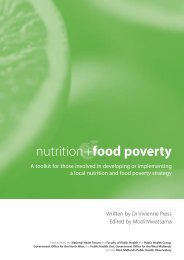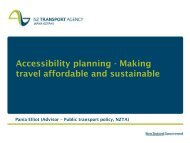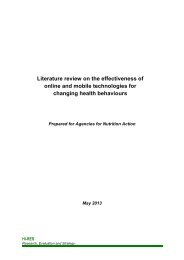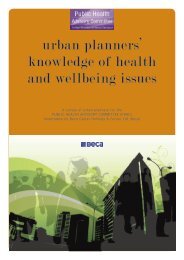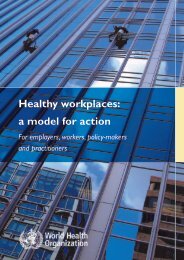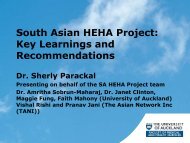enhancing food security and physical activity for maori, pacific and ...
enhancing food security and physical activity for maori, pacific and ...
enhancing food security and physical activity for maori, pacific and ...
- No tags were found...
You also want an ePaper? Increase the reach of your titles
YUMPU automatically turns print PDFs into web optimized ePapers that Google loves.
Enhancing Food Security <strong>and</strong> Physical Activity <strong>for</strong> Māori, Pacific <strong>and</strong> Low-income Peoplessocial capital <strong>and</strong> social cohesion, as well as a reduction in car dependency <strong>and</strong> theassociated lowering of pollution levels.Cost benefit analysisNo cost benefit data are available.RecommendationsThe evidence base in New Zeal<strong>and</strong> <strong>for</strong> examining the effects of access to open space<strong>and</strong> street connectivity on <strong>physical</strong> <strong>activity</strong> is extremely limited. Most of the research thathas been completed in this area was undertaken in the United States, <strong>and</strong> while thefindings are compelling, the urban <strong>for</strong>m of US cities (such as residential segregation,inequality, density etc) is distinct from the New Zeal<strong>and</strong> situation. There<strong>for</strong>e, theevidence from the US is unlikely to be transferable to the New Zeal<strong>and</strong> context. Furtherinvestigation to develop the New Zeal<strong>and</strong> evidence base is recommended.New research should be targeted at exploring the influence of the built environment on<strong>physical</strong> <strong>activity</strong> <strong>and</strong> related health outcomes, with a particular emphasis on the threetarget communities. While new cross-sectional studies will make useful additions to theevidence base, it will be difficult to determine causality, which will limit the strength ofevidence available in New Zeal<strong>and</strong>. Perhaps the most fruitful line of research may comefrom collecting detailed longitudinal data that tracks individuals as they move betweendifferent settings (over the course of the day as well as over the lifecourse) inconjunction with sophisticated measures of the built environment. Current studies suchas the ‘Longitudinal Study of New Zeal<strong>and</strong> Children <strong>and</strong> Families’ as well as ‘Survey ofFamily, Income <strong>and</strong> Employment, Statistics New Zeal<strong>and</strong>’ offer some opportunities.In addition, researchers should take advantage of various ‘natural experiments’ withinthe built environment that take place (eg. the opening of or improvement to urbanparkl<strong>and</strong> or adjustments to the road/cycle network). Undertaking natural experimentswill require the collection of robust <strong>and</strong> timely data to monitor interventions. Longitudinalstudies <strong>and</strong> natural experiments offer opportunities to better underst<strong>and</strong> the influence ofthe built environment on <strong>physical</strong> <strong>activity</strong> of Māori, Pacific <strong>and</strong> low income communities.But both approaches will require targeted funding streams as well as multi-sectoralcollaborations.While it is imperative to develop the New Zeal<strong>and</strong> evidence base linking the pertinentcomponents of the urban built environment <strong>and</strong> <strong>physical</strong> <strong>activity</strong>, it is also important toconsider in parallel the policy levers that can be used to enhance these environments.The development of a National Policy Statement (NPS) in New Zeal<strong>and</strong> offersconsiderable potential to enhance many characteristics of the built environment thatpotentially influence <strong>physical</strong> <strong>activity</strong>. It is important that the ongoing process ofdeveloping a NPS in New Zeal<strong>and</strong>, underpinned by the research that is progressing inthis area, explicitly incorporates an evaluation of the health implications of itsrecommendations.A significant strategic priority of a new NPS should be to specifically target theimprovement of <strong>physical</strong> <strong>activity</strong> in Māori, Pacific <strong>and</strong> low income communities acrossthe country. Given the paucity of research in this area, it will be important to evaluate theimplications of the implementation of NPS-related policies on practice.143



